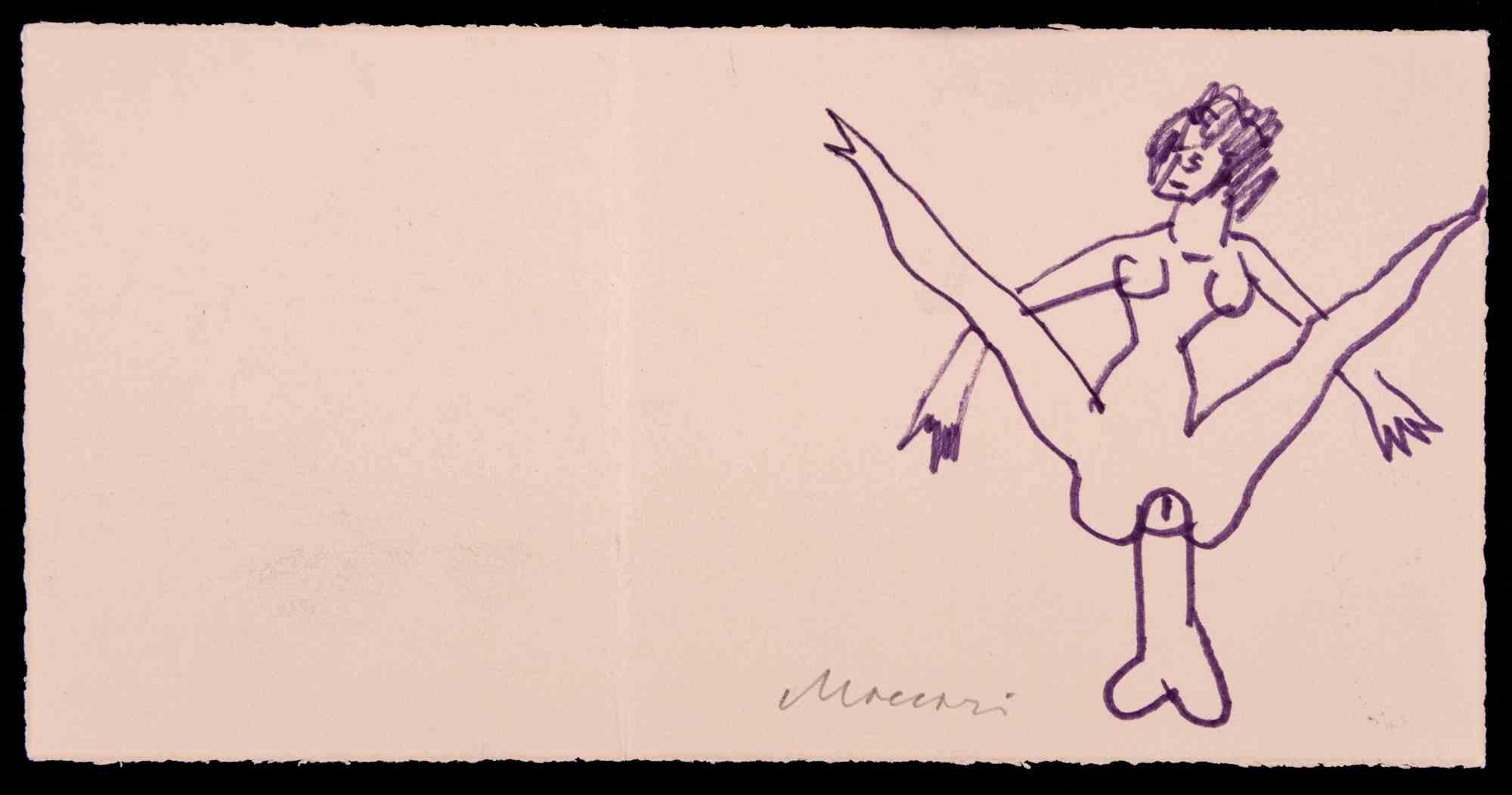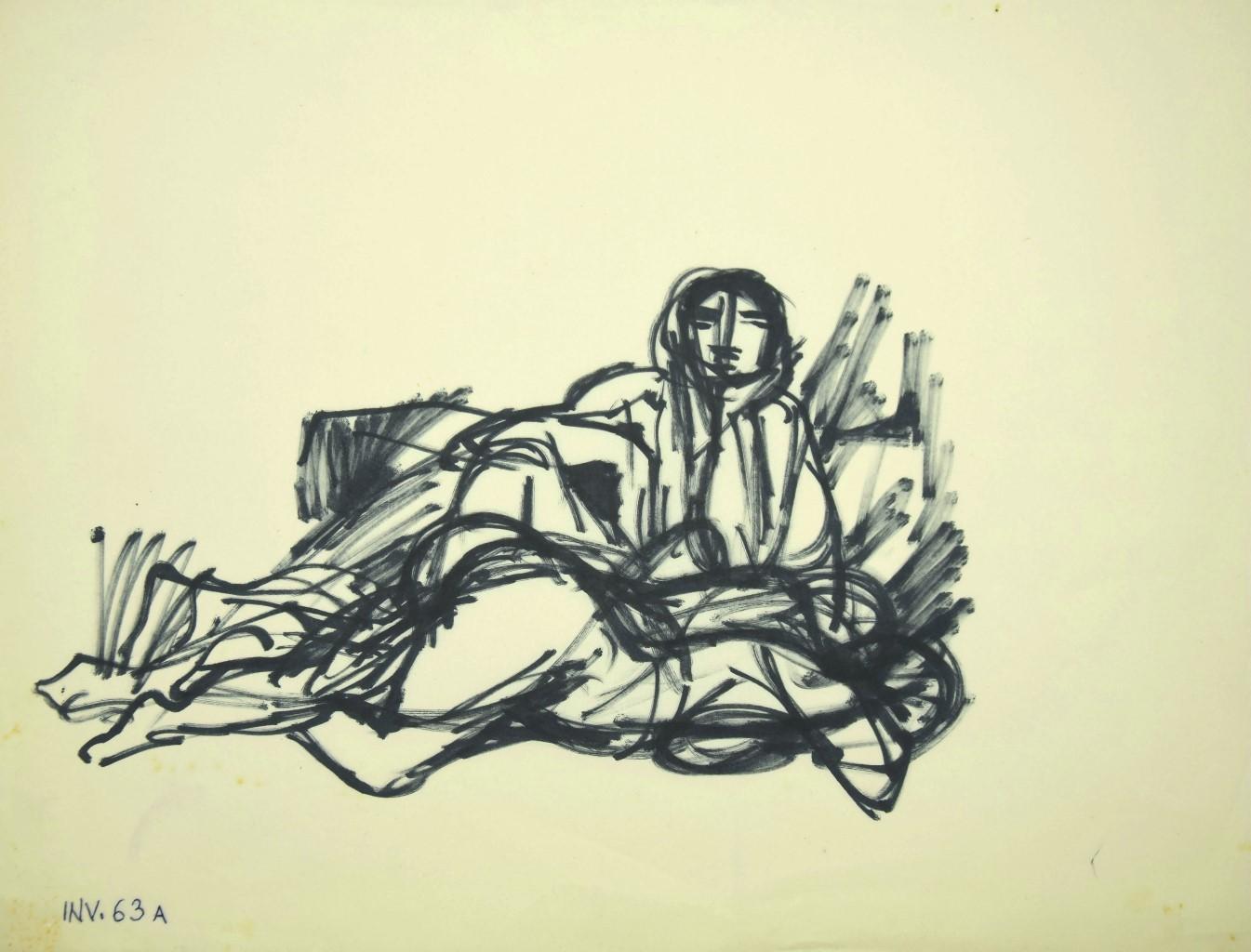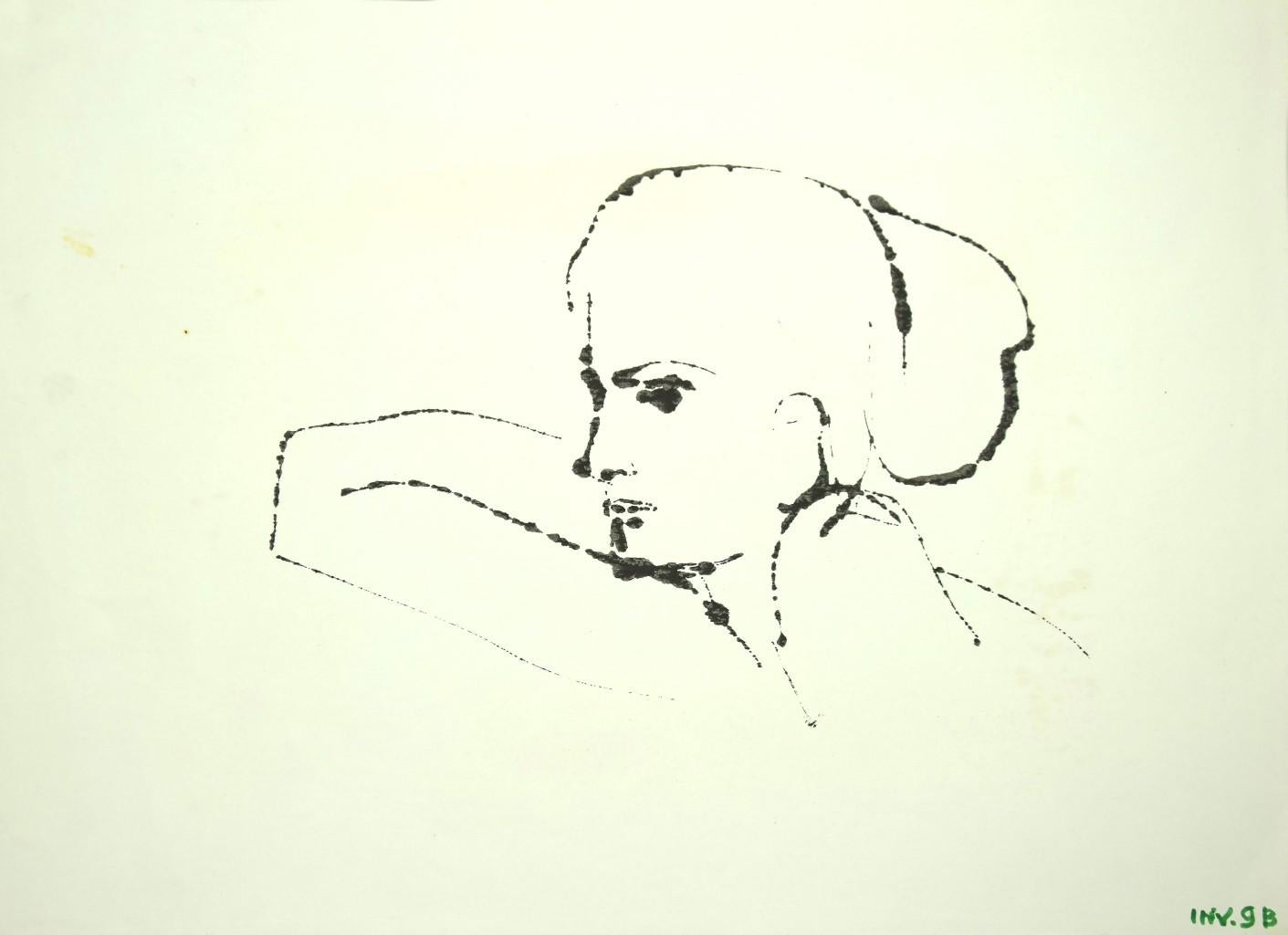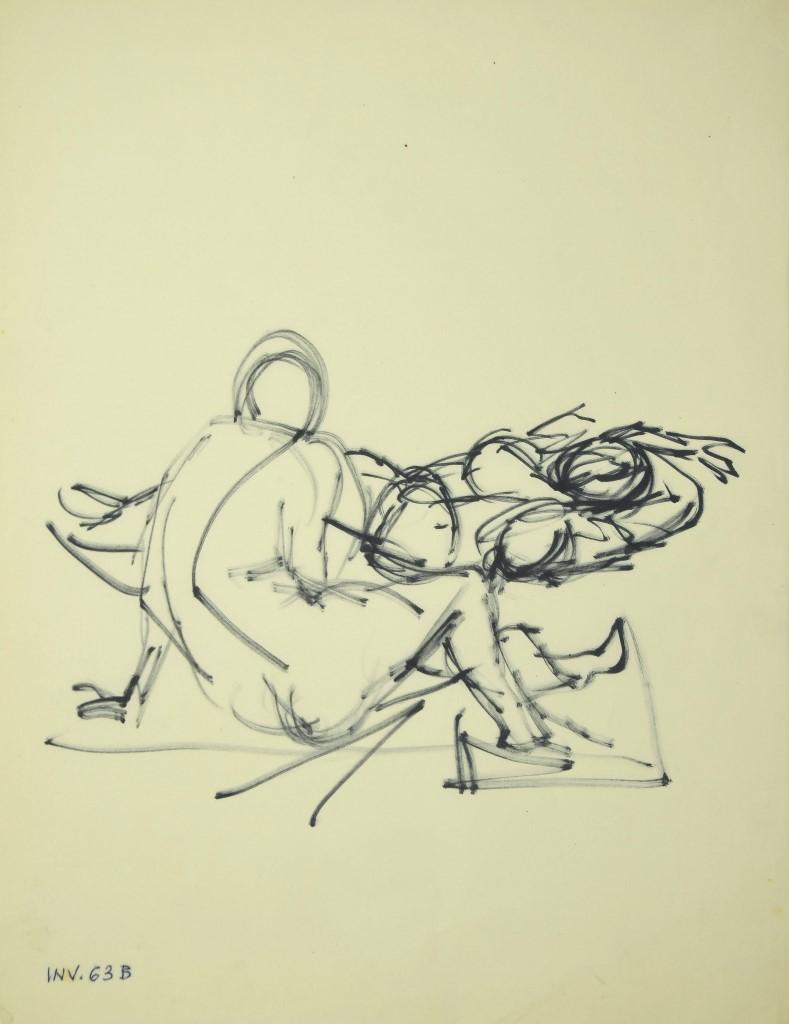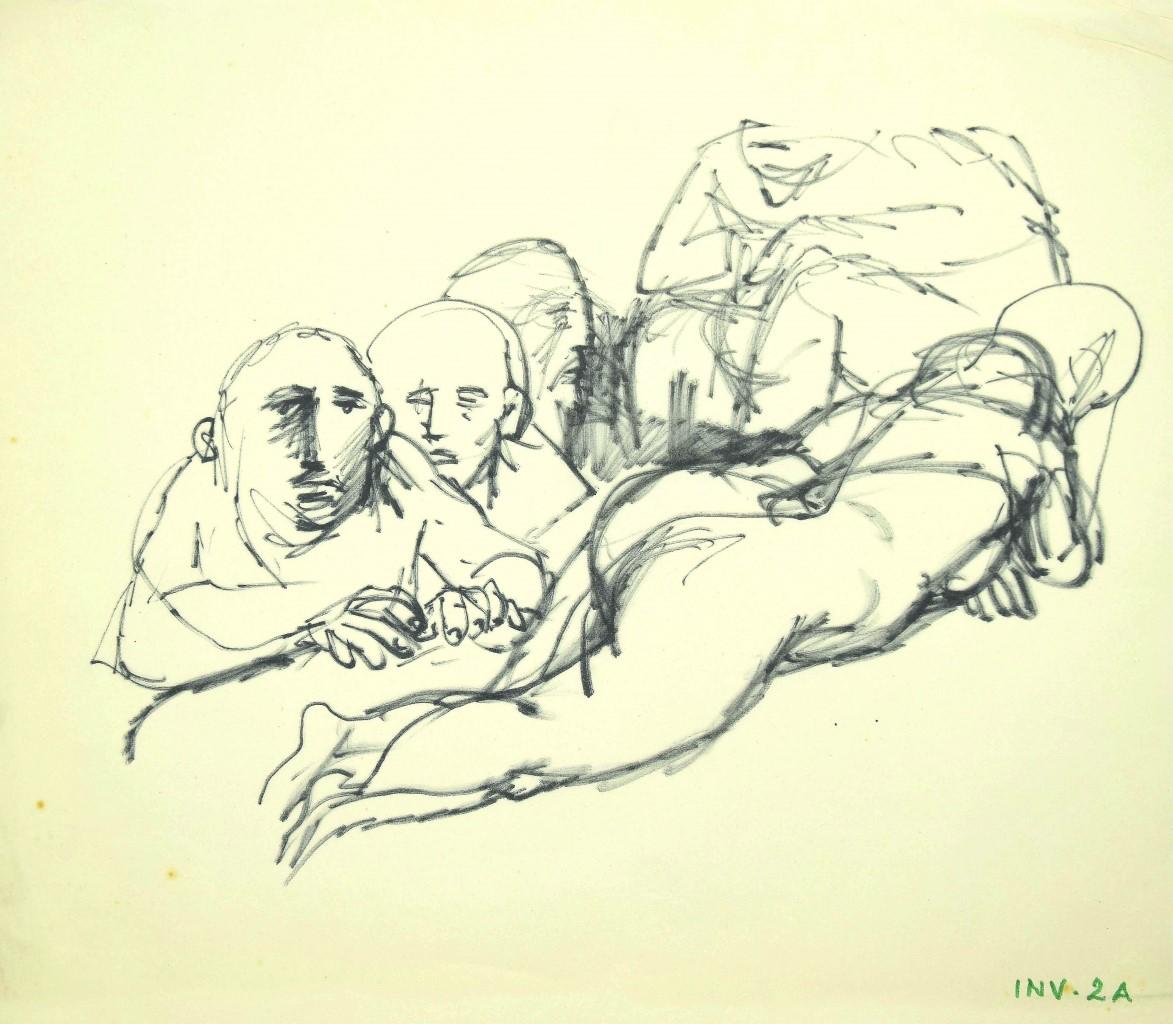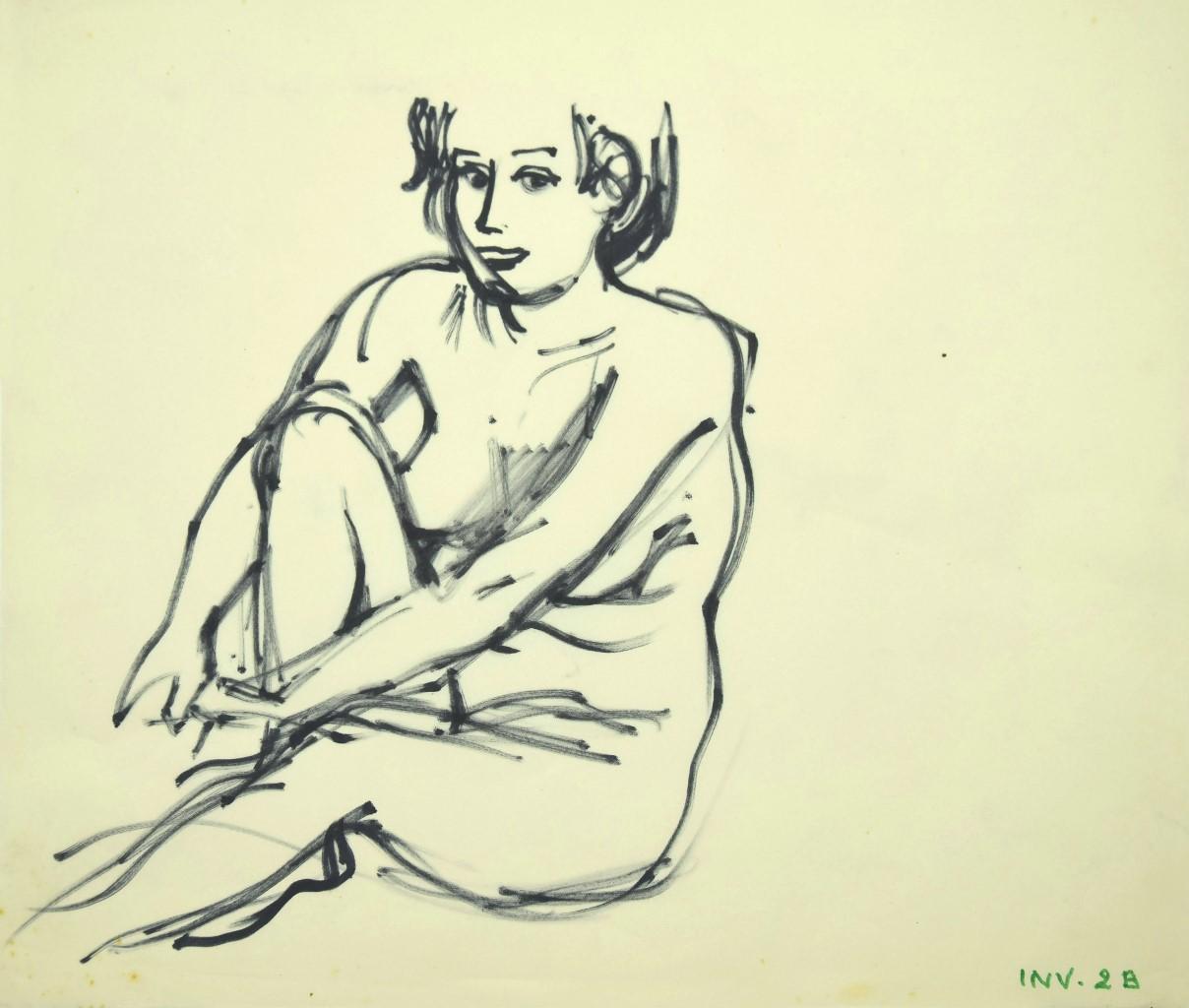Items Similar to Three Graces
Want more images or videos?
Request additional images or videos from the seller
1 of 14
Ray H. FrenchThree Graces1965
1965
About the Item
Three Graces
Pentel marker on paper, 1965
Signed and dated by the artist lower left (see photo)
Part of a series of 100 drawings, this number 97 (annotated lower right corner)
Condition: Excellent
Sheet/Image size: 20 x 15 inches
Provenance: Estate of the Artist
Martha A. French Trust
Ray H. French: The Evolution of an Artistic Innovator
Printmaker, painter, and sculptor Ray H. French was born in Terre Haute, Indiana on May 16, 1919. Terre Haute was a cultural wasteland before the opening of the Sheldon Swope Art Museum in 1942. Thus, with a father as a coal miner and carpenter, art remained a luxury for Ray. Nevertheless, local art teachers Mabel Mikel Williams and Nola E. Williams helped to foster his creativity and unshakable drive to create things of beauty.
After high school, Ray attended the John Herron School of Art in Indianapolis. His studies there were interrupted by the outbreak of World War II, during which he developed surveillance photographs for the Army Air Force. After the war, Ray transferred to the University of Iowa on the G.I. Bill, where he received both his BFA and MFA degrees. The University of Iowa during the 1940s was a cultural mecca with many major art historians and artists. While in Iowa, Ray played an important role in this culture by becoming a founding member of the Iowa Print Group under Mauricio Lasansky.
Following his graduation in 1948, Ray experienced firsthand the rapid rise in creative printmaking in America. By 1949, he had exhibited at The Brooklyn Museum, the Walker Art Center, and MOMA New York. Ray’s early style of printmaking is characterized by pure line engraving on copper plates, a technique suited perfectly to his study of the beauty of animals. This charming and whimsical subject ran counter to the concurrent trends of Lasansky’s horrors of war and Hayter’s non-objectivity, but was equally effective in capturing the public’s attention. Walruses was purchased by the Victoria and Albert Museum, exhibited at MOMA New York and received the Arthur D. Allen Memorial Purchase Prize for its “skillful and economic use of line.” Shortly thereafter, Ray’s treatment of animals developed further into larger format mixed intaglio prints utilizing hard ground, soft ground, etching, and engraving, as exemplified in The Swan.
By the late 1950s, Ray’s style evolved into organic non-objectivity, in which he incorporated personal autobiographical vignettes and symbolism. His work during this time was further characterized by a departure from the traditional squared compositional format to his cutting and rounding of the plate to accentuate organic shapes. Ray’s 1959 Enchantment remains particularly illustrative of his use of etching and soft ground intaglio. Enchantment was successfully exhibited at the Brooklyn Museum of Art for the 12th National Print Exhibition of The American Federation of the Arts and received the Pennell Purchase Prize from the Library of Congress in 1960.
In the 1960s, Ray also started to focus on blind embossing, which he had first experimented with at the University of Iowa. He was extremely prolific and successful with this medium, selling hundreds of prints in small editions of 10 through the Associated American Artist Gallery in New York. In 1966, Ray built upon his mastery of embossing and began developing a shadow box presentation called a graphic construction that combined color, blind embossing, and multi-layered cutouts to revel intaglio compositions. Noted curator William Lieberman purchased Ray’s masterpiece graphic construction, Moon Rays, on the behalf of MOMA New York and another impression was gifted to the University of Iowa Museum of Art by Alan and Ann January in 2004.
Throughout his artistic career, Ray was also a professor and administrator at DePauw University, which occupied much of his time. Outside of his creative expression, Ray was most proud of his teaching and influencing students to find beauty in their daily lives. Specifically, he was a particularly fervent advocate of printmaking and joined the ranks of many of Lasansky’s students who went on to establish printmaking programs and departments and to further lift the stature of intaglio printmaking. During Ray’s time at DePauw, he received grants to travel around Europe. His yearlong stay in Florence led to a series of etchings, drypoints, and woodcuts of Italian and Etruscan subjects and provided inspiration for many years.
In 1984, Ray retired from his university service to work in a private studio behind his home on DePauw’s campus. After several life threatening illnesses, Ray decided to return to his early creative style of realist depictions of nature and landscape. Eventually, Ray’s health deteriorated further with the onset of macular degeneration. Legally blind, he continued to create art until shortly before his death in 2000 at the age of 80. “Sometimes when I look at a work I create, I am amazed at what inspired it. I ask myself, how on earth did I create this?” said Ray once. Ultimately, this quest to find beauty and create inspiring works of art provided the greatest source of Ray’s happiness and fulfillment, evidenced by the breadth and quality of his artistic legacy.
- Creator:Ray H. French (1919-2000, American)
- Creation Year:1965
- Dimensions:Height: 20 in (50.8 cm)Width: 15 in (38.1 cm)
- Medium:
- Movement & Style:
- Period:
- Condition:
- Gallery Location:Fairlawn, OH
- Reference Number:
About the Seller
5.0
Recognized Seller
These prestigious sellers are industry leaders and represent the highest echelon for item quality and design.
Platinum Seller
These expertly vetted sellers are 1stDibs' most experienced sellers and are rated highest by our customers.
Established in 1978
1stDibs seller since 2013
711 sales on 1stDibs
Typical response time: 1 hour
Associations
International Fine Print Dealers Association
- ShippingRetrieving quote...Ships From: Fairlawn, OH
- Return PolicyA return for this item may be initiated within 10 days of delivery.
More From This SellerView All
- Seated Female Nude (Devora)By Julio de DiegoLocated in Fairlawn, OHSeated Female Nude (Devora) Watercolor on paper, c. 1970 Signed in pencil lower right (see photo) A folio from the artist's sketchbook. Done while the artist was in Florida. Conditio...Category
1970s American Modern Nude Drawings and Watercolors
MaterialsWatercolor
- Female Nude StudyBy William SommerLocated in Fairlawn, OHFemale Nude Study Graphite and crayon on wove paper, c. 1928 Signed with the Estate stamp "B" (see photo) Provenance: Estate of the Artist Edward Sommer (his so...Category
1920s American Modern Nude Drawings and Watercolors
MaterialsCrayon
- Reclining Female NudeBy Emil GansoLocated in Fairlawn, OHReclining Female Nude Charcoal on paper, c. 1933 Signed lower right (see photo) Provenance: Weyhe Gallery, New York (Ganso's dealer 1925-1941) Joseph Mark Erdelac, Cleveland, noted collector who had a large collection of Ganso works Ganso was born in Germany in 1895. At age 14, he apprenticed to a baker and then worked his way to America when he was 17. He worked in bakeries in Scranton, Pennsylvania; and Cincinnati and Akron, Ohio. By 1916, Ganso out of a job, and was living the life of a bohemian in New York City, sometimes on less than 30 cents a week.1 In 1921, Ganso painted a realistic nude on a bedsheet, and was forced by the police to remove it from an exhibition. The bedsheet with the painting was later stolen. He soon had a job baking again at $140 a month, and with time to spare for painting and study. Ganso quit baking in 1925 when a New York dealer gave him financial backing of $50 a week. Ganso prospered from his art after that. His work is in over 15 American museums, and the Print Club of Cleveland awarded him a $500 purchase prize for a wood engraving. A versatile artist, he painted a variety of subjects. (from a profile written by Clyde Singer...Category
1930s American Modern Nude Drawings and Watercolors
MaterialsGraphite
- Seated NudeBy August F. BiehleLocated in Fairlawn, OHSeated Nude Match Stick ink drawing, c. 1925 Signed by the artist in pencil lower right: A. Biehle Created at the Kakoon Arts Club, Cleveland. Influenced by friend and fellow artist...Category
1920s American Modern Nude Drawings and Watercolors
MaterialsInk
- Preparatory drawing for Figure Composition, Carmel (CA.)By E. Ambrose WebsterLocated in Fairlawn, OHPreparatory drawing for Figure Composition, Carmel (CA) Graphite on paper, 1931 Signed with the artist's initial "W" lower right corner (see photo)...Category
1930s American Modern Nude Drawings and Watercolors
MaterialsGraphite
- Three Nudes in a GardenBy Aaron BohrodLocated in Fairlawn, OHThree Nudes in a Garden Graphite, c. 1928-1933 Initialed in pencil lower left (see photo) Illustrated: Elliott & Wooden, Aaron Bohrod: Figure Sketches, Fige 9, page 32 (see photo) A...Category
1920s American Modern Nude Drawings and Watercolors
MaterialsGraphite
You May Also Like
- Nude of Woman - Marker Drawing by Mino Maccari - 1970By Mino MaccariLocated in Roma, ITNude of Woman is a violet marker Drawing realized by Mino Maccari in 1970. Hand-signed on the lower margin. Good condition on a little yellowed cardboard. Mino Maccari (Siena, 19...Category
1970s Modern Figurative Drawings and Watercolors
MaterialsPermanent Marker
- Figure - Original Permanent Marker Drawing - Mid-20th CenturyBy Leo GuidaLocated in Roma, ITFigure is an original black marker drawing on ivory-colored paper realized by Leo Guida in the late 20th Century. The state of preservation of the artwork is good. Not signed. INV....Category
Late 20th Century Modern Nude Drawings and Watercolors
MaterialsPermanent Marker
- Figure - Marker Drawing on Paper - 1970sBy Leo GuidaLocated in Roma, ITFigure is an original black marker drawing on ivory-colored paper realized by Leo Guida in 1970s. The state of preservation of the artwork is good. Not signed. INV.9B, on the lower...Category
1970s Modern Mixed Media
MaterialsPermanent Marker
- Figure - Marker Drawing on Paper - 1970sBy Leo GuidaLocated in Roma, ITFigure is an original black marker drawing on ivory-colored paper realized by Leo Guida in 1970s. The state of preservation of the artwork is good. Not signed. INV.63B, on the lowe...Category
20th Century Modern Mixed Media
MaterialsPermanent Marker
- The Voyeurs - Black Marker Drawing on Paper - 1970sBy Leo GuidaLocated in Roma, ITFigure is an original black marker drawing on ivory-colored paper realized by Leo Guida the 1970s. The state of preservation of the artwork is good. Not signed.Category
1970s Modern Nude Drawings and Watercolors
MaterialsPermanent Marker
- Nude - Marker Drawing on Paper - Late 20th CenturyBy Leo GuidaLocated in Roma, ITNude is an original black marker drawing on ivory-colored paper realized by Leo Guida in the late XX Century. The state of preservation of the artwork is good. Not signed. INV.2B, ...Category
Late 20th Century Modern Mixed Media
MaterialsPermanent Marker
Recently Viewed
View AllMore Ways To Browse
Vintage Carpenter Box
Vintage Carpenters Box
American School Mid19th Century Paintings
Arcadia John Johnson
Arthur Steel The Picture Frame
Bethany De Forest
Black Wood Cartier Glasses
Cs Lewis
Mid19th Century Oil Portraits
Religious18th Century
Rolex Watch Los Angeles
Ryan Wilks
Stefanie Schneider Happy Endings
Suzanne Crocker Artist Painting
Texas Cattle Ranch Photograph
Two Girls Servant Oil Painting
Usa Vintage Travel Picture
Vintage Bakers Hutch
